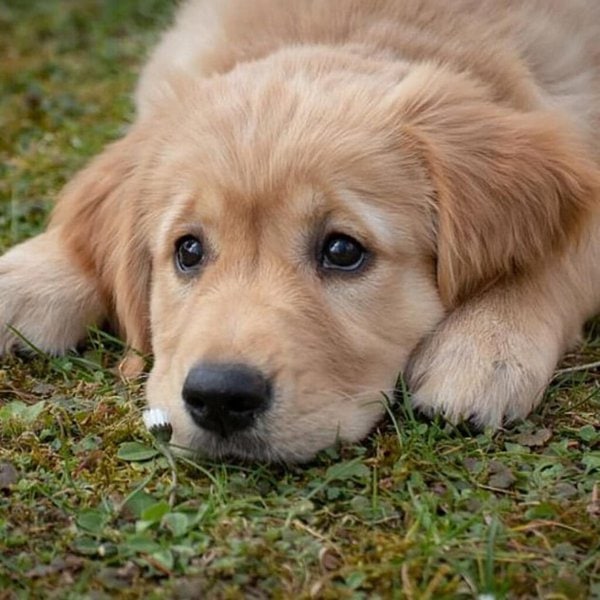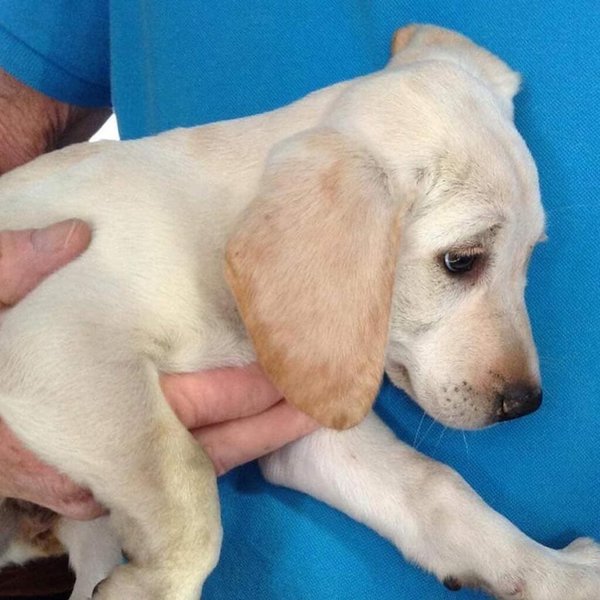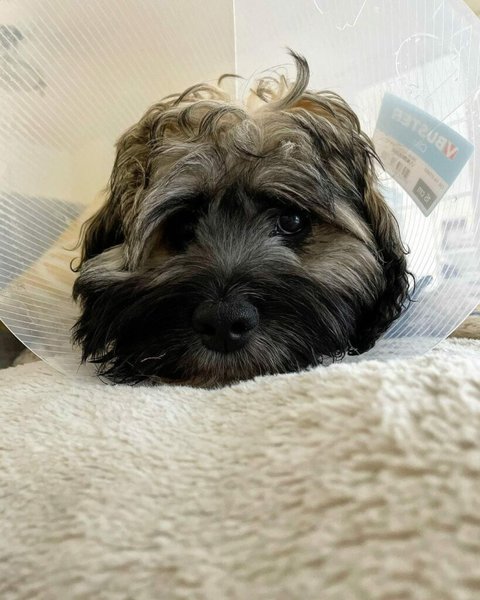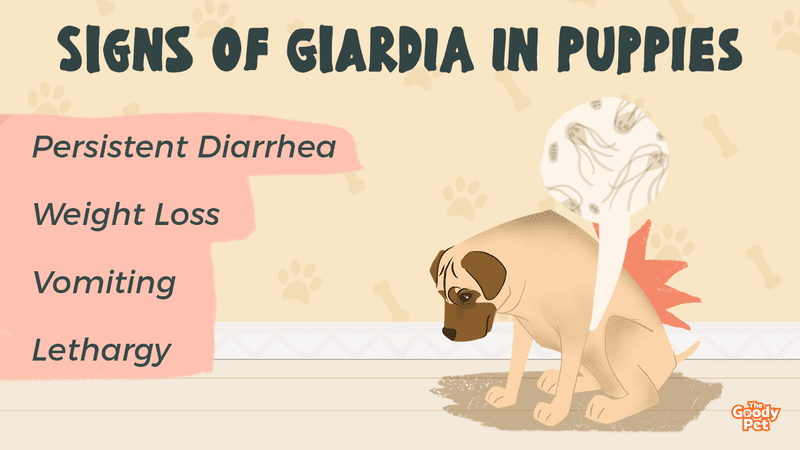Is your puppy constantly having diarrhea? Is its poop often foul-smelling and looks greenish? Or is your puppy not as active as before? Perhaps you should take a look at this article to understand these symptoms your puppy is experiencing when it is suffering from the Giardia infection.
Giardia is a nasty stomach bug that many puppies and dogs get from eating contaminated food or water. From devastating bouts of diarrhea to persistently low levels of energy, giardiasis can take a heavy toll on your pooch.
As a puppy parent, it is absolutely crucial that you understand what giardia is and you have come to the right place for this information. In the sections below, we shall take a look at all you need to know about giardia in puppies from what it is and what causes it to how to treat and prevent recurrences. Let’s dive right in.
Is Giardia Bad For Puppies?
Giardia can have devastating consequences for puppies, especially if they are very young, immunocompromised, or not adequately cared for.
Giardiasis is a common gut infection in puppies that is caused by protozoan parasites known as Giardia intestinalis. The puppies get it from consuming water or food that is contaminated with the cysts of these parasites.
Puppies could also get giardia from licking the cysts off their coats or from consuming contaminated dog or cat poop in the case of doggies with coprophagia.
For most healthy dogs, giardiasis causes nothing more than diarrhea and some abdominal discomfort, after which the dog can recover and go on with their lives. However, giardia in puppies can be a serious matter with several possible complications and health risks.
Here are some of the most common, serious complications of giardia in puppies.
Weight Loss And Malnutrition
Weight loss and malnutrition in puppies who have had diarrhea is one of the most commonly seen complications. This happens mainly due to issues like reduced appetite and the fact that they vomit a lot of what they are able to eat.
Giardia in puppies also affects the gut’s ability to absorb nutrients which results in malabsorption and malnutrition for the pooch.
Stunted Growth
Your puppy may also suffer stunted growth and a general failure to thrive as a result of being infected with giardia. Stunted growth in these dogs happens mainly if they have long-lasting episodes of giardiasis or several recurring bouts.
Dehydration
Dehydration is one of the most serious consequences of poorly managed giardia infections in puppies. Your little pooch will be losing water not only from diarrhea and vomiting but also from the heavy panting a lot of them do as a result of the discomfort.
Recurrence
Another thing that makes giardia in puppies horrible is the fact that they can get it more than once. Recurrences are common especially if the source of the contamination is not taken care of. It can be due to a dirty pup coat harboring cysts or a dog bed, in desperate need of deep cleaning.

What If My Puppy Has Giardia?
The most obvious sign that your puppy has giardia is its persistent bouts of diarrhea.
Diarrhea itself is very distinctive in its appearance and other characteristics as we shall get into shortly.
For some help figuring out whether or not your puppy may have giardia, here are some of the most common signs and symptoms.
Diarrhea
Diarrhea is the most common symptom in puppies who have giardia. Diarrhea itself is usually covered in mucous and will be very foul-smelling. It may have a green tinge to it in some cases and may also have some blood staining.
In most puppies with giardia, the diarrhea is persistent while others have on-and-off bouts.
Lethargy
Diarrhea caused by the giardiasis in your puppy will result in the loss not only of important minerals and nutrients but also of water. Your dog will therefore have very low levels of energy from dehydration, electrolyte imbalance, and malnutrition.
Weight Loss
For puppies who have giardia for several weeks or those that have recurring infections, weight loss is a common symptom you may find. If this is not addressed early enough, it may result in long-term consequences like stunted growth and a generally sickly pup.
Vomiting
Vomiting is an inconsistent symptom and may not occur in all puppies with giardia. For those that do experience this symptom, there will be further loss of nutrients, water, and electrolytes which just make matters worse for the pooch.

How Do You Treat Giardia In Puppies?
The best way to treat and take care of a puppy that has giardia is by taking them to the vet.
Technically speaking, mild infections with Giardia parasites can go away on their own after a few weeks. However, there is no way to tell whether what your puppy has is mild or not so it is best to just play it safe.
Here are the 3 most important things you can do to take care of your puppy if they have a giardia infection.
Get A Vet Involved
A veterinary specialist is your best chance at ensuring that your puppy makes it through the bout of giardiasis alive, healthy, and happy.
If you suspect that your puppy has giardia from their symptoms, the vet will help you get confirmation by running various stool tests. Once confirmed, they will recommend the best drugs to get the infection under control and start the recovery process.
It is very important that you avoid DIY treatment with over-the-counter antibiotics and dewormer medications as you may end up causing more harm than good.
Keep Your Dog Hydrated
If you want to do your part taking care of a puppy with giardia at home, one thing you can do to complement the meds from the vet is to keep your dog hydrated.
Remember that they are losing a lot of fluids from vomiting and diarrhea, and will need as much help replacing that water as they can get.
We recommend that you leave a bowl of clean, cool water in an easily accessible spot for your sick puppy. You can also try to encourage them to drink more water by serving it just before or with their meals.
Feed Your Dog Light But Tasty Meals
Another important task for you when it comes to taking care of a puppy with giardia at home is ensuring that they are eating. Given how traumatized their guts are by the infection, foods that are light and easy to digest while being packed with nutrients are the best to go with.
We recommend you to go with foods, like boiled eggs or chicken for protein, mushed pumpkins for vitamins, minerals, and fiber, and white rice for energy. You can also give your puppy some yogurt if they are not lactose intolerant. This will help replenish their gut microbiota.

How Do You Prevent Giardia In Puppies?
The best way to prevent giardia in puppies is by ensuring that both the dog and their environment are as clean as possible.
This is because giardia cysts are very hardy and can survive anywhere from your couch covers and the dog bed to the soil in your yard. These cysts are what cause the reinfection of your puppy or fresh infections with the Giardia parasite.
Here are a few ways to prevent giardia in puppies by minimizing their exposure to the parasites.
Wash Your Dog After They Are Treated
Giardia cysts will settle pretty much anywhere including on your puppy’s coat. To prevent reinfection after they are treated, it is best to ensure that they get a thorough washing and grooming.
This should help get rid of most, if not all, of these cysts and minimize the chances of your puppy getting giardia again.
Separate Infected Puppies From The Rest
Giardia is very contagious in dogs and can easily be passed from one puppy to another when they sniff or lick each other. To keep healthy puppies from getting infected, it is best to quarantine the puppy that is sick with giardia until treatment is complete and they are no longer symptomatic.
Clean Up After Your Dog’s Potty Breaks
This is particularly important if your dog takes their potty breaks in your yard. The poop parcels are harbors for giardia cysts and could even contaminate the soil.
These cysts can survive up to 11 weeks in these conditions. It is therefore best to spare yourself and your dog the trouble by simply cleaning up the poop as soon as your dog takes a nature call.
Thoroughly Disinfect Your Home
Finally, you need to disinfect your home after your dog has been diagnosed with giardiasis. There are many products that could kill giardia cysts including Lysol, bleach, and undiluted vinegar. Steam cleaning surfaces, furniture, and bedding could also kill giardia.
We recommend the Bissell ProHeat 2X Revolution Max Clean Pet Pro Full-Size Carpet Cleaner to kickstart your post-giardia spring cleaning as a way to protect your puppy. It has different cleaning tools and modes including a hot water mode ideal for helping you get rid of giardia cysts and any other puppy-related messes in your home.





